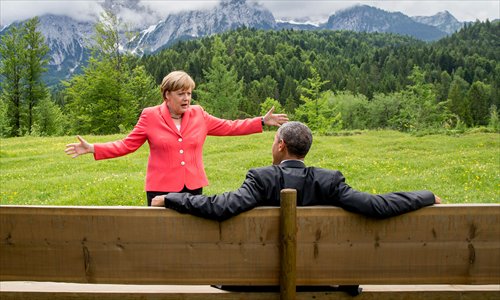HOME >> WORLD
G7 focuses on jihad, talks tough on Russia
Source:AFP-Global Times Published: 2015-6-9 0:18:02
Leaders warn of more economic sanctions over Ukraine if they are needed

German Chancellor Angela Merkel (left) gestures while chatting with US President Barack Obama sitting on a bench outside Elmau Castle after a working session of a G7 summit near Garmisch-Partenkirchen, southern Germany, on Monday. Photo: AFP
World leaders Monday warned Russia it would face stepped-up sanctions for its "aggression" in Ukraine, as they wrapped up a G7 meeting also pledging strong action to fight climate change and Islamic militancy.
At a luxury retreat in Bavarian Alps, the leaders of some of the world's most powerful countries - Britain, Canada, France, Germany, Italy, Japan and the US - also tackled threats to global security posed by Islamist extremism.
Excluding Russian President Vladimir Putin from the summit for a second time, the group closed ranks against Russia. "We ... stand ready to take further restrictive measures in order to increase cost on Russia should its actions so require," said the leaders in a joint communiqué after the two-day huddle.
The tough line from the world's power brokers came as Ukraine's defense minister accused pro-Russian rebels - backed by Moscow - of deploying an army of 40,000 men on the Ukrainian border.
In an unusual move, countries outside the club of rich nations, including Iraq's premier and Nigeria's president, who are both battling deadly jihadist violence, were invited.
Iraq's Prime Minister Haider al-Abadi was invited to discuss the US-led campaign to help his country defeat the Islamic State group that launched a lightning offensive a year ago and have seized over a third of the country's territory.
Nigeria's newly-elected President Muhammadu Buhari presented a "shopping list" to the G7 leaders, seeking their help in his country's battle against the Boko Haram Islamists.
"We reaffirm our commitment to defeating this terrorist group and combating the spread of its hateful ideology," said the leaders, in reference to the Islamic State group.
The summit was also expected to see talks on "foreign fighters" and the threat Islamic extremism poses to the seven industrialized countries.
Merkel and French President Francois Hollande, meanwhile, pushed their G7 counterparts to reach consensus on climate change, ahead of a crunch year-end United Nations summit in Paris. The aim is to send a clear signal to push other nations participating in the Paris summit to seriously commit to reducing dangerous greenhouse gas emissions.
Some analysts believe that the G7 is losing its ability to shape the world and solve its problems due to the rise of emerging economies and the resulting global power shifts.
"The European countries would not be of much help to the US and Japan if [those two countries] want to use the G7 platform to warn China over the South China Sea disputes, given their reluctance to sever economic ties with China," Jin Canrong, a professor from the Renmin University of China, told the Global Times.
"The G7 had its heyday in the 1990s. It has been gradually losing its influence since the financial crisis and the rise of the G20," he said.
Posted in: Europe, Asia-Pacific